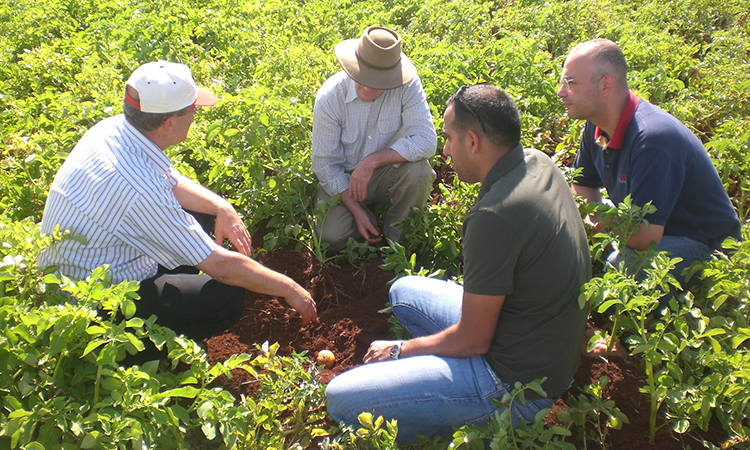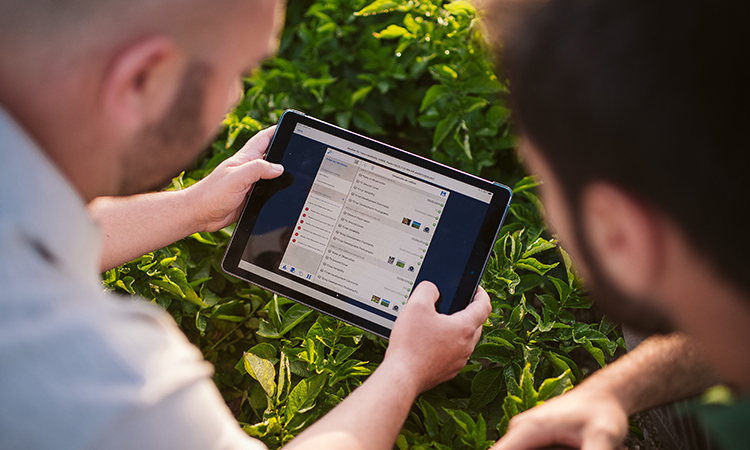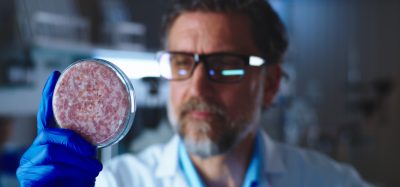Technology, collaboration and policy focus – building a greener food system
- Like
- Digg
- Del
- Tumblr
- VKontakte
- Buffer
- Love This
- Odnoklassniki
- Meneame
- Blogger
- Amazon
- Yahoo Mail
- Gmail
- AOL
- Newsvine
- HackerNews
- Evernote
- MySpace
- Mail.ru
- Viadeo
- Line
- Comments
- Yummly
- SMS
- Viber
- Telegram
- Subscribe
- Skype
- Facebook Messenger
- Kakao
- LiveJournal
- Yammer
- Edgar
- Fintel
- Mix
- Instapaper
- Copy Link
Posted: 11 January 2021 | Sean Westcott | No comments yet
Senior Vice President of Research and Development for PepsiCo Europe, Sean Westcott, discusses sustainable farming and why a greater level of co-operation is required between invested parties to make real change happen.


PepsiCo Senior Vice President Sean Westcott believes farmers are the key to building a more sustainable food system.
Through 2020, our industry and farmers have had to steer through unchartered territory to keep their crops growing and supply chains working effectively.
At PepsiCo we work with more than 2,300 farmers across Europe to source potatoes, oats and corn, among other ingredients, for our food business. Reflecting on the extraordinary year that has passed, I am struck by the amazing resilience and ability to adapt that farmers and growers have shown in order to keep our food system going.
While COVID-19 continues to bring challenges, we are also facing the increasingly disruptive effects of climate change. However, there are several lessons we can take forward as we build a greener future that maintains the balance of our planet.
With the deadline of UN Sustainable Development Goal 2 – zero hunger – now just 10 years away, we all have an opportunity to focus on a decade of action to ensure we can create a sustainable food system to support that goal.
As a business built on agriculture, we are afforded an important position whereby we can use our scale, reach and expertise to influence a positive change in the way industry grows, makes and consumes. But that’s not something we can achieve on our own. Collaboration within our industry and beyond, especially with government, is key to building a more sustainable food system for everyone. There are three key areas of focus that could help us achieve our goals:
Investing and harnessing transformational technology
As a company we have invested heavily in research and development, which has enabled us to roll out such technology as precision agriculture. This helps our farmers gather the latest data on crops, giving them important insights. Using this data, farmers can increase the quality and yields of their crops while ensuring they use just the right amount of water and inputs to maintain soil quality. ‘Precision Agriculture’ is changing the landscape of farming. It is one of our most valuable tools in the elimination of waste.
Our iCrop technology – a mobile and web-based system – captures over one million data points and has been rolled out with our potato farmers in 16 markets in Europe. During the pandemic, when it was not always possible for our 50+ agronomists to get out to meet with farmers in fields, iCrop has remotely provided an insight into how crops are performing, revealing reasons for any changes in yield.


PepsiCo’s iCrop technology helped remotely monitor crop performance during the pandemic.
Data from across our 48,000 hectares of potato farms is being shared with all our farmers so everyone can learn how to improve production to be more sustainable. Farming is a numbers game, and this data is helping us form insights and adapt practices which are driving soil health and improving water input. To our excitement, we think these improvements can be applied more universally across the industry.
Beyond precision agriculture we’ve also been working with Corteva Agriscience to develop an oat genome (oat DNA) that could lead to innovation to develop heartier oat varieties with improved sustainability, taste and nutrition.
The genome will enable research to deliver new varieties that are more resilient and disease resistant. In addition, it has a longer root system to help produce healthier soils that sequester carbon and reduce water run-off, which in turn leads to reduced land usage and other resources needed to grow oats. These types of innovation in crop development could be transformational for the food system of the future.
Putting farmers at the heart of our plan
But technology, research and analysis mean little unless farmers are at the heart of it. Farmer development is a key part of Sustainable Development Goal 2 and it is a fundamental element of our work. Farmers need to be supported economically, socially and environmentally to ensure sustainable practices are embedded in their day-to-day work. Through PepsiCo’s Sustainable Farming Programme, we are providing support to farmers from helping them grow their business to providing community wellbeing. Sharing our expertise to help farmers improve practices is something we take seriously and is a key part of our approach.
We’ve already started doing this with our oat crop. Along with others, we have used data on oats to create a first-of-its-kind ‘Oat Growth Guide’ for farmers, which is shared openly and is providing guidance around oat growth and development. This kind of open sharing of data can be a real game changer to all growers learning and developing together.
This doesn’t come without its challenges. Knowledge should be shared on a broader basis, but taking vast amounts of information, data and insights and equipping other farmers isn’t easy. A key task of mine is to constantly find the best way to take all our 300,000 hectares-worth of experience across Europe and package it up for one farmer.
Collaboration beyond the food industry
To face this challenge, and in order to reform the food system, we need to move past what is right from the perspective of individual businesses. Only by working together can we ensure that future food needs can be met while also protecting and regenerating our planet.
Government can help smooth the course for this in several ways. Firstly, there are many new developments in farming technology, but few farmers are clear as to what the right tools to use are. Government and buyers need to help farmers see through a lot of noise and provide direction and support around technologies that will make a real impact.
When it comes to data, as an industry we need to work collectively to bring more data sets together and create a neater package for farmers to work with. For government, that means being more transparent with data and equipping farmers with the right tools to use it efficiently.
Most people recognise that the system needs to change. Government has a role to play in nudging farmers towards practices that are sustainable. Those who are embracing this transition could be supported and incentivised when taking positive action, particularly smaller growers where it is harder to make the investment.
Transforming our agri-food system is complicated but through innovation, further collaboration and with farmers at the centre of our approach, we can move towards agricultural practices that work in harmony with what the planet demands of us now.
Related topics
Environment, Equipment, Genetic modification (GMO), Recruitment & workforce, Research & development, Supply chain, Sustainability, Technology & Innovation









